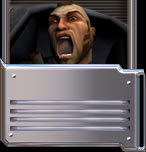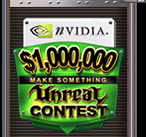| Epic Games Inc. was founded in Rockville, Maryland in 1991. Then known
as Epic MegaGames, Inc., the company was the brainchild of Programmer Tim
Sweeney, who was soon joined by James Schmalz (programmer), Mark Rein (marketing
/ 'biz') and Cliff Bleszinski (designer). Early research for what would
become Unreal began in mid-1994 and continued on until the complete development
team was formed. By this time, James had left Epic to create Digital Extremes,
based north of the border in Canada. However collaboration between Epic
and DE continued and was instrumental in forming the Unreal brand.
Digital Extremes (Headquartered in London, Ontario, Canada) was founded
in 1993. Early work resulted in the shareware phenomenon Epic Pinball, which
was released 10 months after development began, was delivered exactly on
time and soon became a huge success. Epic Pinball was one of the most successful
shareware games ever made, trailing only behind such industry greats as
Duke3D, Doom and Wolfenstein 3D. A sequel soon followed - Extreme Pinball
-- and together they helped fund what would soon be one of the industry's
blockbuster franchises, UnrealŪ and Unreal Tournament.
1996 Unreal is signed to GT Interactive as publisher,
and full development begins.
1997 Jay Wilbur joins the team as "Imperial Advisor",
working with Mark on the 'Biz' side of things and bringing his experience
as a founder member of id software (Doom, Quake).
1997 Steven Polge joins the programming team with a
specialty in AI. Steven came to Epic's attention through the creation
of the famous "Reaper bot" for Quake.
1998 Unreal is published. It goes on to define the leading
edge of 3D technology, introducing to the first person shooter (FPS) genre
such new features as fully dynamic lighting, volumetric and atmospheric
lighting, what-you-see-is-what-you-get development tools, a next-generation
scripting language, and extraordinary customizability.
The gaming community was blown away by Unreal's look. Huge outdoor environments,
stunning scenery and clever enemy AI set the standard for others to follow.
Unreal also introduced the Skaarj to the world - a race of powerful alien
warriors who would appear in future Unreal games and who are now in some
ways the "poster-boys" for the Unreal brand (their wrist blades provided
inspiration for the original Unreal logo).
1999 Unreal Tournament is published. UT was created
specifically to quench the thirst of gamers hooked on the new phenomenon
of "Deathmatch". At first, many are skeptical over the lack of a standard
story line or linear single player experience - but UT soars in popularity
both for LAN play and on the Internet.
The gaming community praised Unreal Tournament for its unnerving artificial
intelligence (demonstrated by "bots" in single player mode), network code
and challenging and fun gameplay modes - deathmatch, capture the flag,
assault and domination. Awards were plentiful and Unreal Tournament became
the most popular online first person shooter.
2002 Unreal Tournament 2003 hits the shelves. This time,
most of the work was undertaken by DE, while Epic concentrated on advancing
the Unreal Engine for future products. Again, the Unreal series sets the
benchmark for graphics and the new Tournament adds innovative game play
features such as combo moves and double-jump.
2003 The story will continue with the launch of Unreal
Tournament 2004.
|












